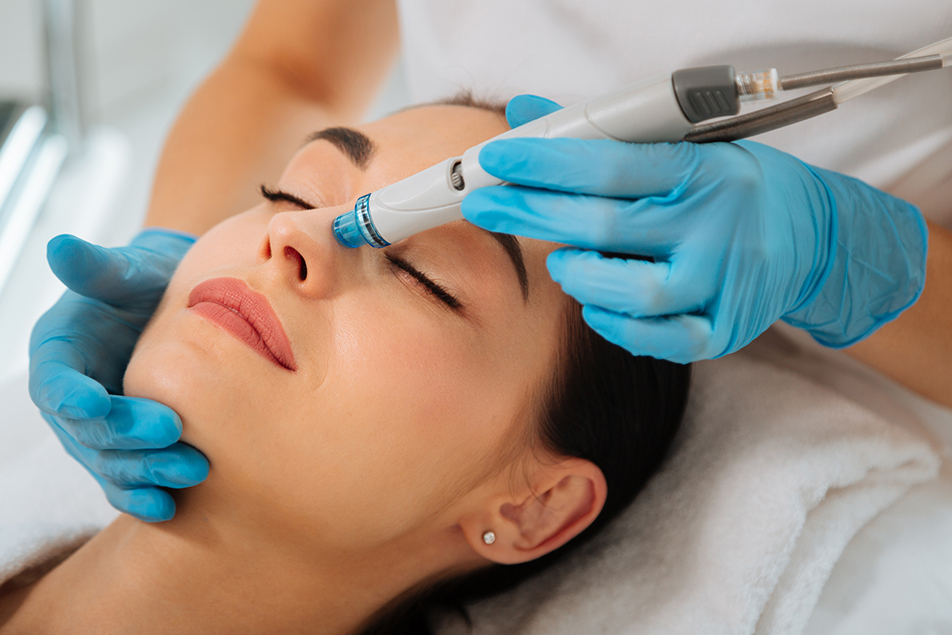
Facials are a great way to pamper not only yourself but also a relaxing way to resurface, rejuvenate and restore your skin to its natural beauty. But not all facial treatments are created equal. For that reason, we asked Josie Trier, aesthetician, PPG – Dermatology, to answer our questions regarding Hydrafacials and the numerous benefits they have to offer.
What is a Hydrafacial?
A Hydrafacial is a skin treatment that uses vacuum-like tips to suction out any dirt, debris or excess oil that can be left behind in the follicles of your skin. While your daily skincare routine has many benefits, it can’t always clear away build-up or impurities or slough off dead skin cells as effectively and as often as it should. That’s where the Hydrafacial is beneficial. It is a deep cleansing treatment that gently exfoliates and resurfaces your skin and is completed in as little as 30 minutes.
Where would someone go for a Hydrafacial, and who would perform the treatment?
Most Hydrafacial treatments are offered and done in a dermatology or plastic surgery office, but some spas provide them. For application, you typically want a licensed aesthetician or dermatologist to perform the treatment.
What can a Hydrafacial do for someone’s skin?
Hydrafacials are great for exfoliation and deep cleaning and offer a myriad of other benefits. Many people struggle with the appearance and maintenance of their skin, but with the help of this facial treatment, they can achieve healthier-looking skin by:
- targeting clogged pores
- diminishing the look of pores, fine lines and wrinkles
- replenishing dehydrated skin
- addressing hyperpigmentation
- correcting dark spots
- minimizing breakouts
Who would be a good candidate for a Hydrafacial treatment?
Anyone! Hydrafacial treatments are great for many skin types, including sensitive ones. Most skin types can easily tolerate the Hydrafacial treatment. But, if you are unsure if a Hydrafacial is right for you, it’s best to speak with your physician or skincare professional first and possibly have a skin consultation or sensitivity test done. That way, your provider can help you customize and choose the best treatment for your unique skin condition and needs.
While these types of facials are beneficial for most skin types, some individuals should wait to have the treatment done. Hydrafacials are not recommended for anyone with severe pustular acne. The treatment could irritate the infected area, so it would be best to wait until the acne has cleared up before the facial. Additionally, it’s not recommended you receive a Hydrafacial if you are:
- pregnant
- breastfeeding
- sunburned or an active tan
- have had dermal fillers
- had light or laser treatments
- recently had facial waxing or a chemical peel
- undergone a recent surgical procedure
- have an active rash, cold sores, skin infection or skin condition
If you’re still unsure whether you should have the treatment done, please speak with your primary care provider or skin care professional to see if you should refrain from the facial treatment.
How can patients prepare for a Hydrafacial treatment?
If you know you are getting a Hydrafacial, it’s best to avoid over-the-counter acne medications, topical exfoliants, retinol, alpha or beta hydroxy acids before treatment. It’s also a good idea to refrain from excessive sun exposure or actively utilizing a tanning bed before your appointment. For a complete list and pre-appointment protocols, please speak with your provider.
What results should someone expect from a Hydrafacial treatment, and how long do they last?
An appealing benefit of a Hydrafacial is that there is no downtime compared to other treatments. Many people will leave a treatment seeing visible refinement, a more even tone, and bright, glowing, healthy skin. Initial results, like smoothness and hydration, typically last about 5-7 days. The overall improvement of skin health lasts a bit longer, about 4-6 weeks, because it is a deep cleansing treatment.
How often can someone get a Hydrafacial?
One Hydrafacial treatment every four, six or even eight weeks can help maintain your skin’s health, especially if your skin is feeling a little dull. These treatments are an excellent way to give your skin a reset while improving any problem areas you are experiencing like fine lines, wrinkles, dark spots and oily congested skin.



